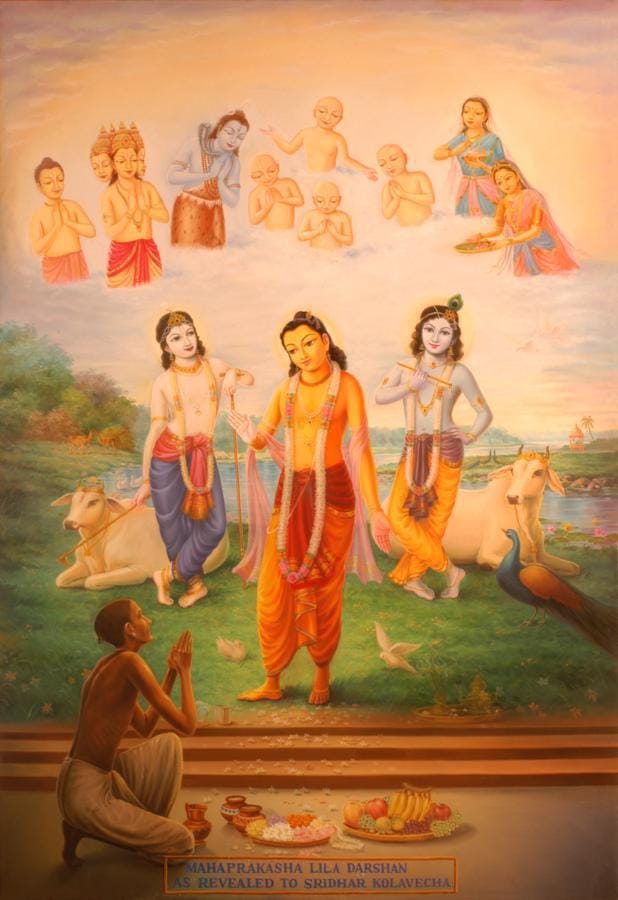Māyā's Greatest Trick

I'm sitting here at my computer, the night before Ekādaśī, thinking of what to write for the pre-Ekādaśī posting I'm supposed to be sending out now. Yesterday was one of the most important days of the year for me: the disappearance day of my Śrīla Gurudeva and the appearance day of Śrīla Bhaktivedānta Vāmana Gosvāmī Mahārāja. I now have a special opportunity to write something in glorification of these two mahābhāgavatas. Even though there is so much to say, I'm having a difficult time thinking of what to write. I feel like anything I'd say about them would be inadequate. I'm tempted to skip this posting day.
I remember one year on my Gurudeva's disappearance day festival in Jagannātha Purī, I hid behind a pillar because I was afraid that I'd be called on to speak. Everyone was giving such beautiful glorifications and I didn't want to expose myself as being the only person among the devotees there that couldn't give a heartfelt glorification. But then a friend of mine, in his glorification, said:
Vaiṣṇavera guṇa gāna, korile jīvera trāna. The only diet of the disciple is the glories of his guru. If someone thinks that I am too unqualified to glorify my guru, then actually he is not a disciple at all. This is the biggest trick of māyā: to think, "I am not qualified to speak the glories of my guru." If we ever come to a place or situation where the glories of our guru are not being told or we feel are not necessary to speak — that place is worse than hell.
After that I couldn't remain in my hiding spot, so I moved away from the pillar and was eventually called on. By Śrīla Gurudeva's mercy, I managed to speak something and it somewhat flowed.
This evening, also, I was hiding in my room knowing that Kishori Mohan prabhu would definitely call on me to speak if I went downstairs. The bhajans finished, the glorifications started, and I still remained sitting on my bed getting super mental about what to do. But then I remembered that kathā in Purī and mustered up the courage to go down. Soon after I got there, he called on me. I hadn't chosen a particular point to focus on and I went all over the place. Anyhow, even though I made a fool of myself tonight, I'm lucky to have had the opportunity and I'll try to continue taking it whenever it comes. In the next pre-Ekādaśī posting, after I've had a little more time to meditate, read and hear more, I'll try to write something about these two personalities.
Really, everyone should have the opportunity to glorify their gurudeva. If one doesn't have a chance to glorify in a group of devotees, one can at least speak something to a friend. Actually, if anyone reading this feels inspired to share anything about the glories of my Śrīla Gurudeva, Śrīla Vāmana Gosvāmī Mahārāja or anything on guru-tattva in general, please send it to me and I'll add it to the next pre-Ekādaśī posting I make for them. If you wish to remain anonymous, that's totally fine. Also, just know that the Vine of Devotion subscriber list is very small so there's nothing to be afraid of. :)
How much have I become bound in affection?
It is nice to contemplate how merciful śrī gurudeva is, how much he has helped me, and what he is doing for me. But more importantly, we should contemplate: “What have I done for Gurudeva, for his pleasure? How can I become worthy of the exalted position of truly being his disciple?” Otherwise, I won't be able to understand anything about his glories and his mercy towards me. My Paramgurudeva said:
It is insufficient merely to dwell on how much the Vaisnavas love us or consider us to be their own. This is because the personal satisfaction that comes from thinking we are loved by the Vaisnavas is nothing but an external symptom of the desire for sense gratification, which lurks in the deepest region of our hearts. If, instead, we begin to measure how much we have become bound in affection to the Vaisnavas, it indicates that we are on our way to attaining the very perfection of all desires. Until we can identify Vaisnavas and develop an intimacy with them in which we regard them as our bosom friends, we will be unable to realise the true nature of their affection for us.
(from One Must Correctly Identify a Vaiṣṇava)
If I'm not seriously endeavoring to become a disciple of śrī gurudeva and bound in that relationship, all my attempts to glorify him will result in a combination of words that might sound pretty and like a nice glorification, and people may even start to think highly of me, but those words won't hold any weight. Still I have to try, because, like we heard, to not do so would be to fall for māyā's greatest trick.
vandanā korite mui kato śakti dhori
tamo-buddhi-doṣe mui dambha mātra kori
tathāpi mūkera bhāgya manera ullāsa
doṣa kṣami’ mo-adhame karo nija dāsa
What power do I have to glorify the Vaiṣṇavas? Afflicted by ignorance, I only exhibit conceit. Yet, even one who is dumb [such as me] is greatly fortunate and joyful at heart [to have an opportunity to glorify them]. [O Vaiṣṇavas,] forgive the faults of this fallen soul and make me your own servant.
(Śrī Vaiṣṇava-vandanā Verses 9–10)
Ekādaśī is a day for self-reflection
In the article by Śrīla Vāmana Gosvāmī Mahārāja that I sent out a couple of days ago, he showed us how to deeply assess ourselves on the disappearance or appearance days of śrī gurudeva. I really liked the point he made on how we should also make a special endeavor to do this every Ekādaśī:
Jagad-guru Śrīla Bhaktivinoda Ṭhākura said, “Every fifteen days, on each Ekādaśī, a person should record how much progress he has made in his performance of sādhana-bhajana.” But we do not do that. And should that record be kept on a piece of paper or within our hearts? Only by recording it in our hearts will we be able to analyse our progress. Every Ekādaśī a person should make a point to ‘record’ how much harināma he did in the last fifteen days, how much time he spent discussing śāstra and how much service he engaged in. Only then can he understand whether he is making progress or whether he is going backwards.
Since last Ekādaśī, I successfully managed to report daily to my friend how I did in various areas of my life, like I mentioned in my previous pre-Ekādaśī posting. In case you're interested to see how I've been doing it, here is an example of what I'll be sending him tonight on WhatsApp:
1 day till next Ekādaśī (19 December)
⏰ 5:45AM
🛌🏻 11:51PM
🛐 ✅✅✅✅✅✅✅☑️✅✅✅☑️✅✅✅
📿 ✅✅✅✅✅✅✅☑️✅✅✅✅❎✅✅
✍️ ✅✅☑️✅✅❎✅❎✅❎❎❎❎✅✅
🗓️ ❎✅☑️☑️☑️✅☑️☑️❎✅❎❎❎☑️❎
🚫 ❎✅✅✅✅✅✅✅
(☑️ means I half-did it)
If you managed to do something similar since last Ekādaśī, I'd love to hear about it. Please write in the comments below!
This daily report program has helped me a lot in getting out of the slump I was in. I'm feeling excited to make updates to my program tomorrow. But Śrīla Vāmana Gosvāmī Mahārāja gave me something to reflect on: "Should that record be kept on a piece of paper or within our hearts? Only by recording it in our hearts will we be able to analyse our progress."
I'll continue this program, but just because I managed to write a checkmark in each category doesn't necessarily mean I've made actual progress. Merely going through the external motions and really taking śrī gurudeva's instructions to heart are two different things. Śrīla Vāmana Gosvāmī Mahārāja said, "What I may perceive as the end of my efforts in the realm of sādhana-bhajana may actually be the very beginning."



Comments ()